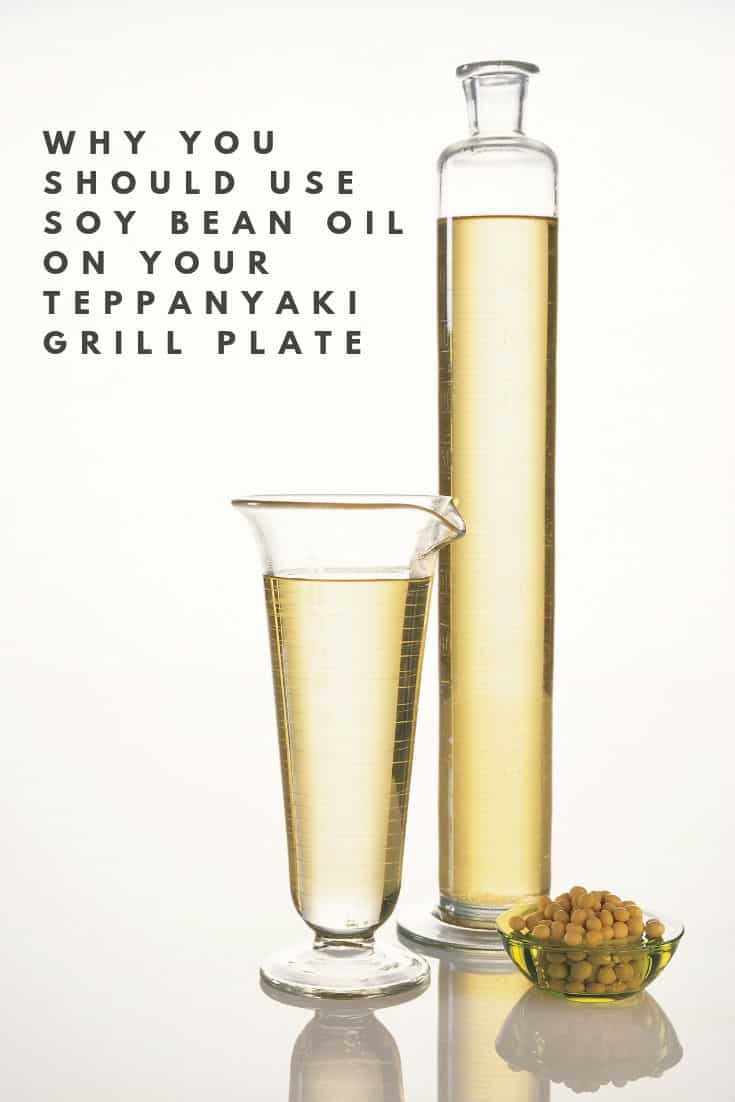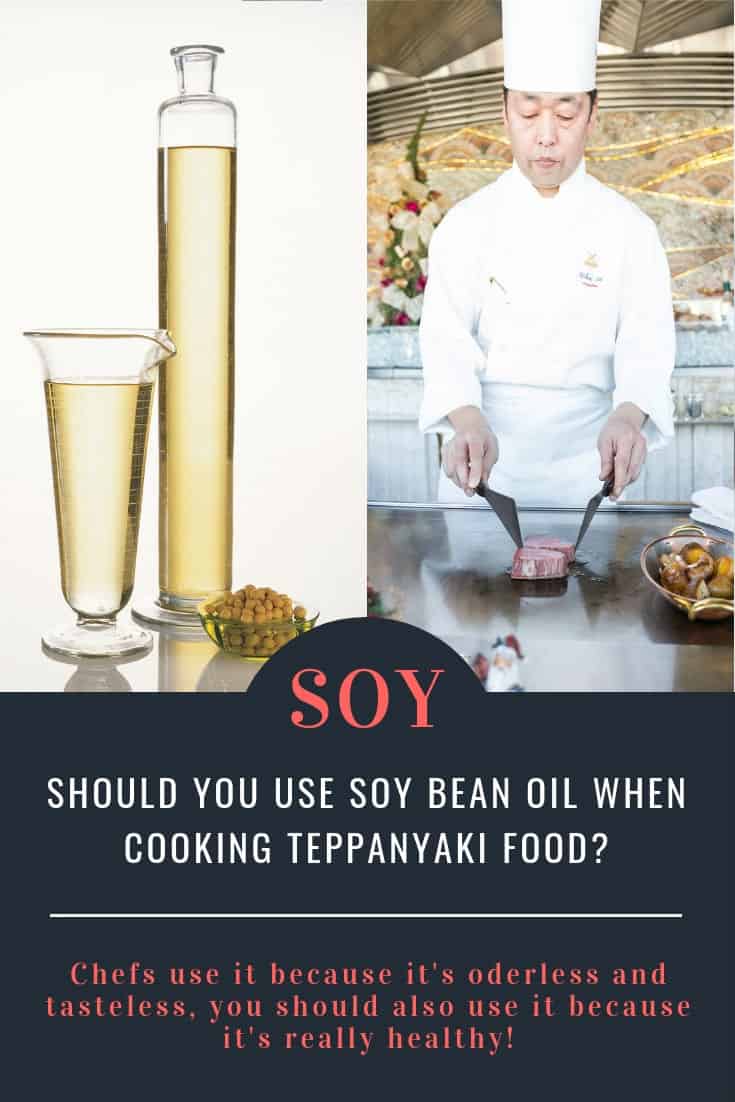2 Important Reasons to Use Soy Bean Vegetable Oil for Teppanyaki
The Teppanyaki style of cooking has been around since the 1800s in Japan.
Traditionally the Teppanyaki iron girdle or skillet was much smaller than it is today and it was cooked in residential areas and not displayed as a cooking exhibition for public amusement.
However, in the 1900s as thousands of thousands of foreign tourists flock to Japan and the iron industry was introduced in Asia, Japanese chefs found a way to turn cooking into an entertainment for foreign high-paying customers; thus the Teppanyaki style of cooking was born.


Check out our new cookbook
Bitemybun's family recipes with complete meal planner and recipe guide.
Try it out for free with Kindle Unlimited:
Read for freeIn this post we'll cover:
Why do Teppanyaki chefs Prefer to use Soybean Oil?
Teppanyaki cooking includes ingredients such as shrimp, beef, chicken, scallops, and a host of various types of vegetables depending on how the chef wants his cuisine to taste like.
It’s interesting to know that most of the Teppanyaki recipes are inspired by Western cuisines, but is somehow adapted to the Japanese style of cooking.
Other ingredients such as soybean oil are also typically used alongside Yakisoba noodles, sliced meat, and cabbage.
This is a text overlay image of the original work by the United Soy Bean Board under cc.
Soybean oil is tasteless and odorless compared to other cooking oils and because of this Teppanyaki chefs prefer it over other types of cooking oils, so they can experiment with the taste of their recipes.
Also check out these top teppanyaki grills for your home we reviewed.
It’s Good for your Health
When it comes to health benefits soybean vegetable oil tops it out among other types of vegetable oils.
It’s no wonder why the US domestic consumption of soybean oil has more than quadrupled from 1,652,000 tons in 1964 to 9,375,000 tons as of 2018.
Of course, it is recommended that you use non-GMO soybean oil in order to take advantage of all the health benefits of soybean oil.
Unfortunately, it has been found that GMO-based soybean oils tend to have higher Omega 6 essential fatty acids than Omega 3 , and an imbalanced Omega essential fatty acids intake could lead to health complications, which is why chefs prefer natural soybean vegetable oil.
That’s why it’s so important to get a non-GMO oil like this one I use.
New research headed by Kevin Fritsche, Ph.D. – a professor in animal science at the University of Missouri says,
“Our evidence suggests that you can achieve a heart-healthy diet by using soybean, canola, corn and sunflower oils instead of animal-based fats when cooking,”
which further solidifies the proof that soybean vegetable oil is the healthy option for Teppanyakirestaurants when it comes to cooking their meals.

This is a compilation image of the original work by the United Soy Bean Board and Chef preparing the course by City Foodsters on Flickr under cc.
Could This Also be One of the Reasons for Longevity Among the Japanese People?
The Japanese people are not only known for most coveted longevity, anime, bullet trains, cherry blossoms, ingenuity and sushi, but also for their unique cooking style that is craved by locals and foreigners alike.
Dashi, for example, is said to be very healthy as well.
There are 3 Japanese in the top 10 oldest living people in the world right now and they are Nabi Tajima (117 years old), Chiyo Miyako (117 years old) and Misao Okawa (117 years old).
That says a lot about Japan! According to experts in order for this to happen certain factors need to play a role in these people’s lives.
1. Healthy Environment
2. Healthy Diet
3. Positive Outlook in Life and Good Relationships
The air quality and general environment in Japan is very good plus the merging of rural areas and major cities give a great sense of awe and wonder as well as peace of mind.
It makes people close to Mother Nature and it has been proven scientifically that we humans share a symbiotic bond with this planet, therefore it is a health benefit to live surrounded by Nature.
The food in Japan is a mix of raw and cooked delicacies and their preferred diet is both red and white meat, fish meat and other kinds of seafood, as well as lots of green vegetables and fruits.
It is rare for foreigners to see Japanese chomp on pizza and other not-so-healthy foods 24/7, which is why they’re at optimal health most of the time.

Since Japanese people are very respectful by tradition, they also develop very positive relationships with each other and foreigners as well.
Living in relative peace in a virtually crime-free country with an occasional amusement here and there, as well as having a few laughs with family and friends enhances their mental and emotional health.
And with all 3 of the greatest qualities of life combined it is now clear why Japanese people live longer than other people in the world.
Conclusion
Perhaps the health benefits of soybean oil are somewhat infinitesimal compared to all of the factors that give Japanese people longevity, but the fact that it is included in their diet is something amazing to ponder.
In the food pyramid fats, spreads and oils (soybean oil being one) form one of the foundations of a healthy diet, especially if taken in the recommended small amounts.
The essential fatty acids they contain which are the Omega 3 and Omega 6 compounds is good for cardiovascular health as well as act as an anti-inflammatory agent that prevents other chronic diseases in the body like high uric acid and rheumatoid arthritis.
Check out our teppanyaki buying guide for home grill plates and accessories.
Is soybean oil good or bad for you?
Soybeans have fatty acids and in GMO based Soy bean oils they are more Omega-6 polyunsaturated fats than Omega 3. An imbalanced Omega essential fatty acids intake could lead to health complications, so you should only use non-GMO Soy bean oil.
What are the health benefits of soybean oil?
Soy beans are low in saturated fat and are completely trans fat free whilst having high poly- and monounsaturated fat counts. It’s also the principal source of omega-3 fatty acids and a great source for vitamin E.
Is soybean oil better than olive oil?
Oil from soy beans is a much healthier option than olive oil, given that is didn’t come from a genetically modified organism (GMO) and is 100% certified organic. Olive oil contains about 10% linoleic acid and a very small amount of omega-3 fatty acid where soy bean oil has a more balanced omega 6 and omega 3 fat-count.
What is healthier soybean oil or canola oil?
Soybean oil has little saturated fat and a large number of unsaturated fats. Because it only starts to smoke at high temperatures (256 °C) and because it’s inexpensive, it’s the best option for grilling, like on a Teppanyaki grill. Canola oil has a high content of unsaturated fats and is the healthier choice. It also contains omega-3 and omega-6 fatty acids.
Also read: these are the best vegetable oil substitutes you can use in your baking or frying
Check out our new cookbook
Bitemybun's family recipes with complete meal planner and recipe guide.
Try it out for free with Kindle Unlimited:
Read for freeJoost Nusselder, the founder of Bite My Bun is a content marketer, dad and loves trying out new food with Japanese food at the heart of his passion, and together with his team he's been creating in-depth blog articles since 2016 to help loyal readers with recipes and cooking tips.
